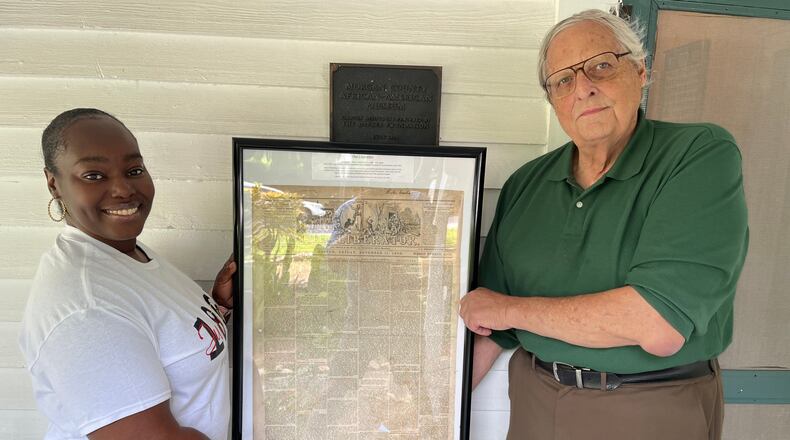From 1831 to 1865 “The Liberator” newspaper, published and edited in Boston by William Lloyd Garrison, was the most widely circulated anti-slavery newspaper in the United States.
Garrison, the leading white abolitionist of the time and the founder of the American Anti-Slavery Society, never failed to publish the influential paper every week for 35 years. The last issue was published in December, 1865, the same month as the ratification of the 13th Amendment which abolished slavery.
In the final issue, Garrison wrote that “The Liberator” “will then be discontinued for the reason that the object for which it was started has been accomplished – slavery not only having been abolished by the war for the Union, but also by Constitutional Amendment. What a grand and sublime triumph.”
On Wednesday, June 19, Frank Walsh, who for more than 30 years owned and operated a rare book and document business in Atlanta, presented the Morgan County African American Museum on Academy Street with a framed copy of “The Liberator” dated Nov. 11, 1859. The issue includes an account of a raid of a Harpers Ferry, Virginia arsenal to seize weapons for a planned slave insurrection led by John Brown. The attack failed and Brown was captured, tried and later hanged.
The issue also includes a lengthy letter from the noted orator, writer and statesman Frederick Douglass.
“The paper became my meat and my drink. My soul was set all on fire. Its sympathy for my brethren in bonds--its scathing denunciations of slaveholders--its faithful exposures of slavery--and its powerful attacks upon the upholders of the institution--sent a thrill of joy through my soul, such as I had never felt before!
I had not long been a reader of the “Liberator,” before I got a pretty correct idea of the principles, measures and spirit of the anti-slavery reform. I took right hold of the cause…”, Douglass said of “The Liberator” after he escaped from slavery and moved to Massachusetts.
Walsh said he thought Juneteenth, the national commemoration of the need of slavery in the U.S. after the Civil War, was an appropriate time to donate the issue to the museum.
“It belongs here,” said Walsh.
Morgan County African American Museum Director Samantha Jones said the museum would find an appropriate way to display the piece of history.
Credit: Morgan County Citizen
Credit: Morgan County Citizen
MEET OUR PARTNER
Today’s story comes from our partner the Morgan County Citizen. The Morgan County Citizen is an award-winning weekly newspaper of Madison, GA. Visit them online at morgancountycitizen.com.
If you have any feedback or questions about our partnerships, you can contact Senior Manager of Partnerships Nicole Williams via email at nicole.williams@ajc.com.
About the Author
Keep Reading
The Latest
Featured




